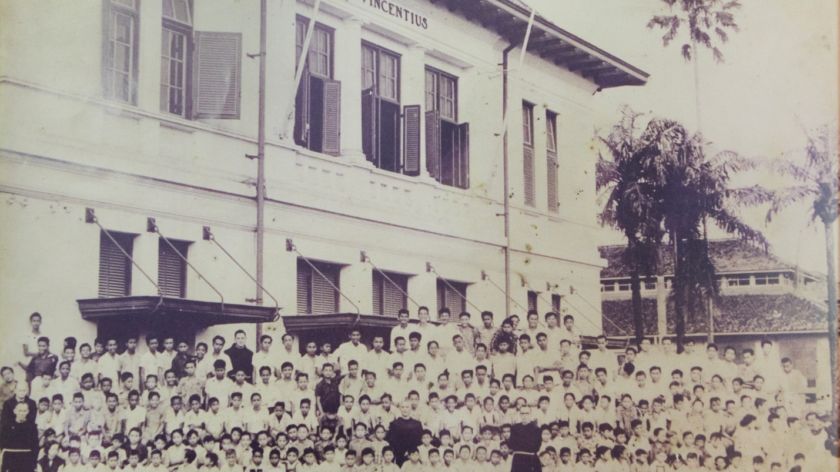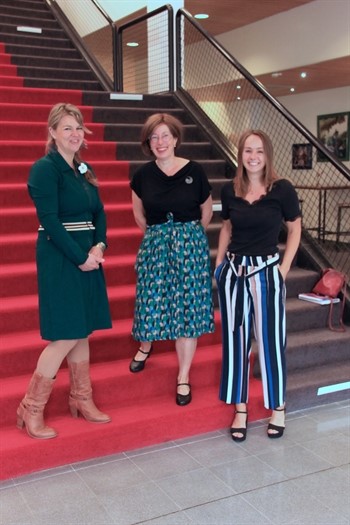Historians bring research on ‘colonial re-education’ into the classroom
-
 Sint-Vincentius orphanage in Batavia, 1930. Photo: archive of the Sint-Vincentius in Jakarta
Sint-Vincentius orphanage in Batavia, 1930. Photo: archive of the Sint-Vincentius in Jakarta
In order to ‘cultivate’ generations of obedient citizens, Dutch colonial rulers quickly turned their attention to children. Three Radboud historians have now won the Radboud Science Award for their research into re-education, and they are turning it into lessons for primary school children. ‘We are not going to simplify it.’
The shock was huge when 1300 secret children’s graves were discovered at several old colonial ‘re-education’ schools in Canada this summer – also in the Netherlands.
‘But what struck me’, says historian Marleen Reichgelt, ‘was that nobody asked: what about us?’ What she is talking about is that the Dutch also had plenty of colonies. And, for example, also in Surinam, Dutch colonists founded boarding schools. There, children were housed too – far away from their parents and communities.
‘We don’t want to claim that mass graves will be found in the Dutch East Indies and Surinam as well,’ says Reichgelt. But she believes that the fact that no questions are being raised about it says a lot. Marit Monteiro, Maaike Derksen and Marleen Reichgelt, all members of the Radboud Institute for Culture and History (RICH), are researching the so-called ‘civilisation offensives’ that targeted children in the former Dutch East Indies.
They look at the implementation of the civilization offensives and study their scale. Additionally, they are also taking the differences within the colonies into account, considering that the former Dutch East Indies alone consisted of over 150 different ethnic groups with their own languages and cultures.
Intimate sphere
Today, the historians will receive the Radboud Science Award for their research. Every year, three of these awards are given to research projects at Radboud University. Together with educational experts, the winners can then develop a curriculum about their project for seventh and eighth graders.
‘Many colonial interventions did not focus solely on ‘the history of great men’, politics or economics, as people assumed for a long time’, says Reichgelt on Zoom, with Derksen next to her. ‘They also focused on the household, on education and on the promotion of Western forms of cohabitation such as marriage and the nuclear family. Colonial powers sought to ‘civilise’ people’s private lives according to Western standards from the second half of the nineteenth century onward.’
And children, the historians explain, soon became an important target. Children could be moulded into obedient subjects of the colonial empire. Where, after receiving a Western education and learning the meaning of ‘hard work’, they would be able to start a Christian family. Thereby creating a generation of obedient citizens. Reichgelt: ‘Or colonial subjects.’ All around the world, historians have written and said a lot about this subject. But not in the Netherlands, according to Reichgelt and Derksen.
Why not?
Derksen: ‘That’s a very important question. We do have some ideas. For one, your place of education matters a lot. Leiden University, for example, still has a very traditional perspective on colonial history. But we don’t have a definitive answer yet. However, finding it would be a very nice research project.’
Reichgelt: ‘It still seems to be a blind spot. The conclusion of our research is: also in Dutch colonies, there were many interventions aimed at children’s lives. If we can start with those children, we can have a real impact. That’s also something we see in the sources. The idea that those children were blank slates, who hadn’t formed a connection yet.’
‘The Netherlands is lagging behind in research on child separation’
Derksen: ‘There’s a lot more research being done on these child separation practices in England and the United States. But the Netherlands is lagging behind. We are trying to change that with our project.’
The Netherlands often seems to have difficulty with its colonial past. The history of slavery wasn’t addressed for a long time. Do you notice this sensitivity?
Reichgelt: ‘We condemn slavery nowadays – everyone agrees on that. Our research into interventions in children’s lives shows all kinds of layers in which genuine charity became mixed up with invasive forms of upbringing and education. That’s the major painful area in our research, which also touches on, for example, the adoption debate. Modern international adoption, which has now been halted in the Netherlands, has colonial roots. It’s rooted in ideas of Western superiority. We know what is good for these children. But something that may benefit an individual child can have devastating consequences on a large scale and over a long amount of time. Especially if generations of children are taken away – even with good intentions – from their parents to be adopted into Western countries.’
Derksen: ‘These good intentions make it difficult to talk about. It makes the subject precarious and complex. And nuance is important.’
Can you cite examples of those good intentions?

Reichgelt: ‘One example is what happened in Dutch South New Guinea. The Marind-Anim lived there. They fought with another ethnic group over a colonial border between the Netherlands and England.
Derksen: ‘Dutch subjects attacking English subjects, that was unacceptable.’
Reichgelt: ‘So we had to start “civilizing” them.’
Derksen: ‘That didn’t work at all in the beginning. Then they said: we must take these children away. It is a tainted environment. So they were re-educated – 1,000 kilometres away in Catholic institutions in the Moluccas.’
Reichgelt: ‘Then they were brought back to found new villages and to live in family homes. A total rupture with the lifestyle of their parents. The Marind-Anim had their own traditional dress, but had to wear different clothing, learn a different language, and cut their hair. Remove bodily decorations. All classic examples.’
Are there still people who claim it was well-intentioned?
Together: ‘Yes.’
Reichgelt: ‘The mindset truly was that these children were growing up in cultures that were doomed to become extinct.’
Derksen: ‘And: we have to save them.’
And this is still noticeable, according to you.
Derksen: ‘Yes, think of all the development projects with the goal to educate children in Africa, South America and Asia. Those types of education are all modelled after Western education.’
What impact did this re-education have on the children themselves?
Derksen: ‘Part of our project is aimed at reconstructing the lives of the children. Some got a good job and a family and climbed the colonial social ladder. Others disappeared. I’ve spoken to people who had been in orphanages or other re-education institutions between 1930 and 1950. Some found it terrible. Others cherish that time. They say: I may not have had a mother, but the nurses and other children were like family. The stories vary a lot. Both within orphanages and between institutions.’
You have the opportunity to explain your research to primary school students. How do you convey such complex concepts to children?
Derksen: ‘Many primary school pupils still associate colonization with the Dutch East India Company, spices and so on. You don’t hear anything about it on Jeugdjournaal. Perhaps the subject is seen as too complex.’
‘You don’t hear anything about colonisation on Jeugdjournaal’
Reichgelt: ‘We put it like this: what was life like as a child in the Dutch East Indies? What was it like as a Christian boy and as a Moluccan girl? There are many photographs, magazines and letters in which children appear. This way, we show how the colonial policy was aimed at ‘cultivating’ new generations according to western norms and values, but also how this policy worked in practice. For us, bringing our research into the classroom involves also bringing our historical craft into the classroom. Asking questions, researching sources, and contextualising information from them.’
Derksen: ‘We let the children do their own research and then we talk about it with them.’
Reichgelt: ‘We also try to explain that colonial ideas are very persistent. Many primary schools still have collection boxes for children in other countries. That makes it complicated. Because then you have to deal with those good intentions again.’
That’s probably very hard to explain to children.
Derksen: ‘I think that if you ask children: imagine that there is a school in Russia that collects clothes for you, would you be happy with that? If you give them material to put everything in context and ask critical but open questions, you’ll come a long way.’
Reichgelt: ‘We’re not going to lecture. That doesn’t work.’ Laughs. ‘And it’s very colonial.’
You’ve already indicated that you don’t want to talk down to the children.
Reichgelt: ‘We won’t shy away from using difficult terms such as child separation or superiority.’
Derksen: ‘They may not understand it right away, but at least they’ve heard about it. The subject is complex. We are not going to simplify it.’
Awards
The Radboud Science Awards 2021 will be presented by rector Han van Krieken on Wednesday, the 22nd of September.



